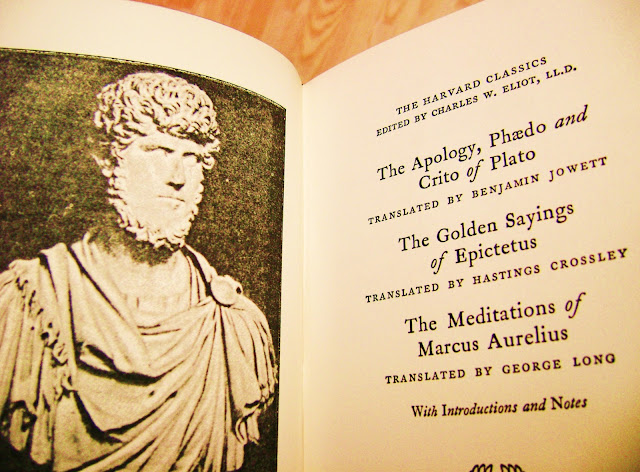Meditations with Marcus Aurelius
Such as are thy habitual thoughts, such also will be the character of thy mind; for the soul is dyed by the thoughts.
One of my methods of minimizing bias in my readings and reviews is to avoid introductions. For Meditations (tr. by George Long), I made an exception since the biographical note was at the beginning and only a page long. Naturally, learning that Marcus Aurelius (r. 161–180) persecuted Christians during his reign over Rome was something that inevitably altered my perspective. (If anything, it turned out for the best, giving me a better understanding of and context for the book.)
Stoic philosophy has long interested me with its emphasis on mind and attitude vs. emotions and circumstances. As I understand it, the overwhelming intent of Stoicism is the achievement of spiritual peace in the midst of physical/external turmoil, becoming mentally "uncontaminated by pleasure, unharmed by any pain, untouched by any insult, feeling no wrong . . . accepting with all his soul everything which happens and is assigned to him as his portion . . . " (III:4). Aurelius elaborates on how this can be done, though his continuous repetition of the same advice suggests it is more difficult to carry out than comprehend. Ironically, some of what he says is similar to what Jesus taught, with an important difference: while Christians believe that peace comes from God (Phil. 4:7, Gal. 5:22, Jn. 14:27), Aurelius believes you can find peace from within yourself:
It is in thy power to live free from all compulsion in the greatest tranquillity of mind, even if all the world cry out against thee as much as they choose, and even if wild beasts tear in pieces the members of this kneaded matter which has grown around thee. (VII:68)Others of his ideas have more universal relevance: do "every act of thy life as if it were the last" (II:5), and don't covet what you don't have - instead look at what you have and see "how eagerly they would have been sought, if thou hadst them not" (VII:27). Good words to live by. And despite his own illustrious position, Aurelius repeatedly speaks of the folly of fame: "How many after being celebrated by fame have been given up to oblivion; and how many who have celebrated the fame of others have long been dead." (VII:6). This freedom of mind - balanced by a consciousness of human mortality and governing of emotional instincts - is very appealing, and something which has plenty of practical use in the real world.
 |
| Marcus Aurelius in his youth |
Aurelius, at times, makes exceptions to his own rules. Slaves are not allowed to practice freedom of speech (XI:30), and women are inferior to men (e.g. he uses sexist language equating emotions with womanhood). Aurelius can rise above society's conventions, perhaps, but he is unable to think outside of the times in which he lives.
Nor outside of his personal bias. While reading this, I could not help but be amazed at how someone with purportedly high moral and ethical standards could be capable, with the very anger he preaches against, of brutalizing a minority group. But in reflection, as is the case with recent totalitarian regimes, it makes perfect sense. Every dictator has had great ideals and good intentions, and to his followers these will become his glorious, superhuman legacy, however contradicted by the way he treats dissenters and other unwanted members of society. Does this make his ideals any less admirable? If they are noble ideals, perhaps not; nevertheless, it challenges every reader to compare that leader's words with historical reality and not disregard his actions as somehow subservient to his dreams.
4 out of 5 stars.




Comments